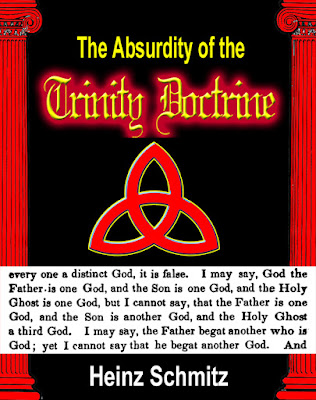From George Edward Ellis in 1856 Christian Examiner:
Another fact most significant of the unscriptural character of the doctrine of the Trinity is, that the texts which are quoted to support it are peculiarly embarrassed with doubts and questions as to authenticity, exactness of rendering, and signification. The three prominent proof-texts most likely to be first adduced, and which promise at first sight to be most available, are the least reliable. Of these three favorite passages with Trinitarians, on which so much scholarship and ingenious reasoning and pleading have been expended, the foremost one is that in 1 John v. 7. This text comes nearest of any in the Bible to a statement of the Trinitarian formula, though still falling short of the statement by all the distance of the difference between Three agreeing in One, and Three being One. Yet this text is now discredited as wholly without authority, as a corruption, an interpolation, foisted into the record. Every Christian scholar, of whatever denomination, competent to pass an instructed opinion on the matter, admits that St. John did not write that sentence, and that the words were most unwarrantably introduced into a manuscript written some centuries after the Apostolic age, the crowning proof of the fact being that no one of the Fathers quotes the text. Now let us at least have the benefit of this allowance, — that the only sentence which is acknowledged to be spurious in the New Testament as we read it, was introduced and is retained for the sake of its supposed announcement and support of the doctrine of the Trinity. That text is to us a type of the unscriptural origin and the unscriptural character of the doctrine.
The second of these favorite Trinitarian proof-texts is 1 Timothy iii. 16: "Great is the mystery of godliness: God was manifest in the flesh," &c. As the passage stands, it neither presents the slightest embarrassment to the Unitarian, nor affords the slightest support to Trinitarianism. But with the gloss and the forced construction put upon the passage, the word mystery is interpreted as signifying, not a disclosure of something before concealed or unknown, but as implying an announcement of an occult and impenetrable secret; and the word godliness, which means simply piety, is regarded as designating the Godhead, or the mode of the Divine Existence. Our readers are probably for the most part well informed as to the question of scholarly criticism opened on the text, whether a very ancient Greek manuscript has the character O or Q, and whether, as a consequence, we should read in the English,
"Which was manifest in the flesh," or "God was manifest in the flesh." As the Unitarian may claim, on grounds of criticism, that the passage should read, "Great is that marvel of piety which was manifested in the flesh," so also the Unitarian may consent to withdraw all such criticism from the text, and read it as others read it, while he asks, with some considerable earnestness, what shadow of argument can be drawn from it in support of the Trinity. Are Unitarians to be forbidden to believe that " God was manifested in the flesh," or that Christ was a marvellous exhibition of piety?*
Buy The Doctrine of the Two Natures in Christ EXPOSED! for only 99 cents on Amazon by clicking here. Click here for a local listing.
The third of these favorite Trinitarian proof-texts is Acts xx. 28: "Feed the Church of God, which he hath purchased with his own blood." The question raised by variations in manuscripts, and other sources of critical information, is whether we should read "the Church of God " or "the Church of the Lord." Our aim here is not to present the merits on either side of the results which criticism reaches on these texts, but simply to show that the passages which Trinitarians would be most likely to quote are the very ones which are most embarrassed or dubious in their authority or their signification. Professor Samuel Davidson, an Orthodox critic whose conclusions are among the most recent ones which have been offered to scholars, after a most candid arbitration between the disputed words in the Greek which give the two renderings, decides strongly in favor of "the Church of the Lord."
* Professor Stuart, in the Biblical Repository, 1832, p. 79, says: "I cannot feel that the contest on the subject of the reading can profit one hide so much, or harm the other so much, as disputants respecting the doctrine of the Trinity have supposed. Whoever attentively studies John xvii. 20-26, 1 John i. 3, ii. 5, iv. 15, 16, and other passages of the like tenor, will see that 'God might be manifest' in the person of Christ, without the necessary implication of the proper divinity [Deity] of the Saviour; at least, that the" phraseology of Scripture docs admit of other constructions besides this: and other ones, moreover, which are not forced."
[Treatise on Biblical Criticism, Vol. II. pp. 441 - 448. We may add, that Dr. Davidson, though a Trinitarian, is as decided in his rejection of 1 John v. 7, as "spurious," and in his accordance with the critical judgment which reads 1 Tim. iii. 16, "Great is that mystery of godliness which was manifested in the flesh," &c.]



